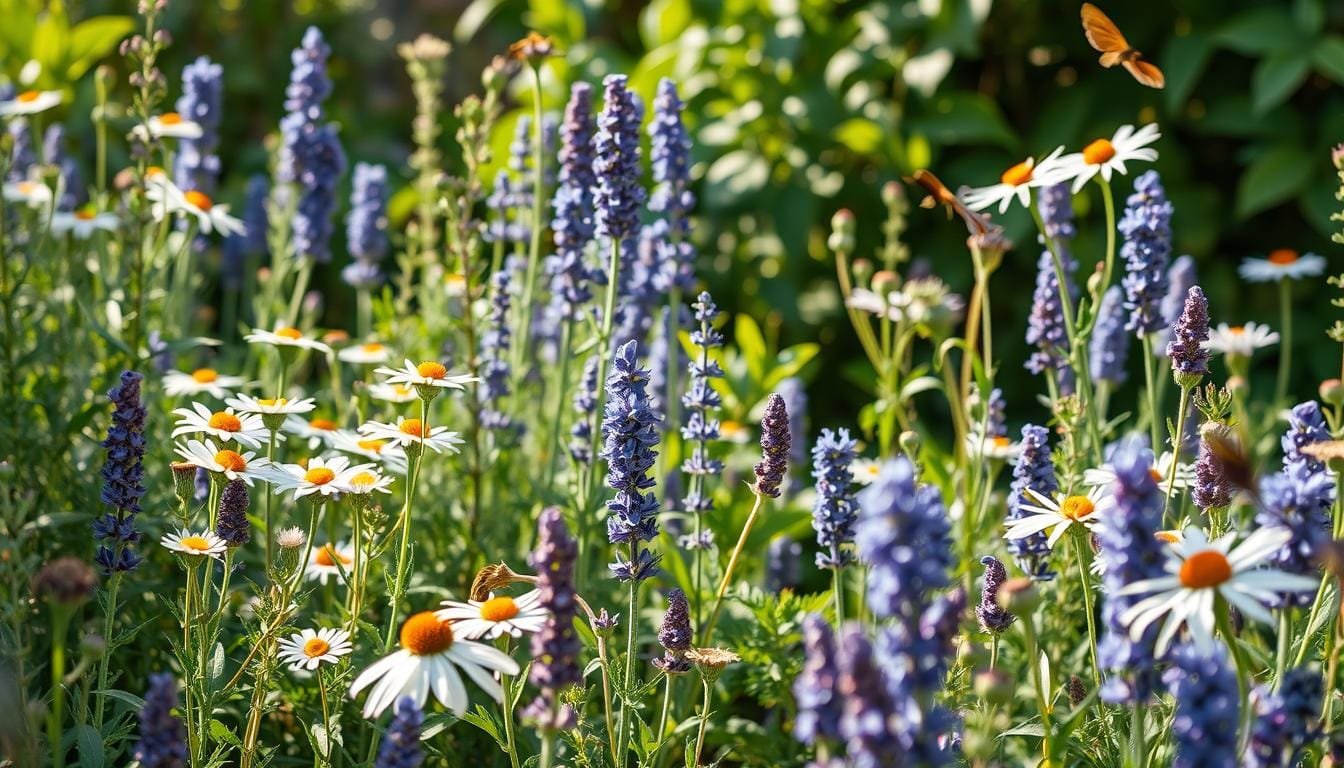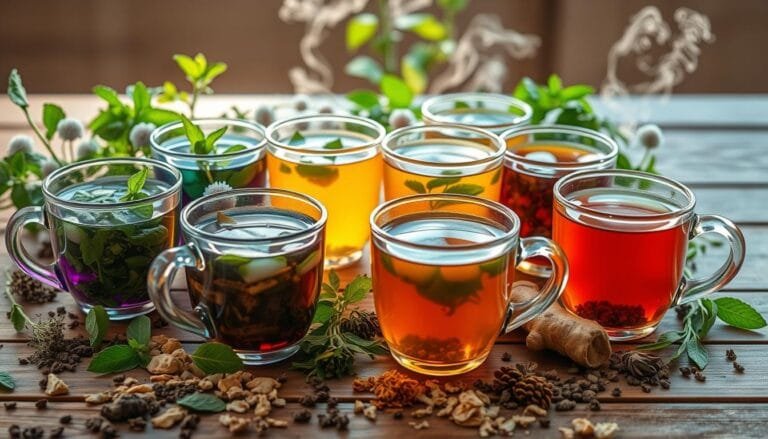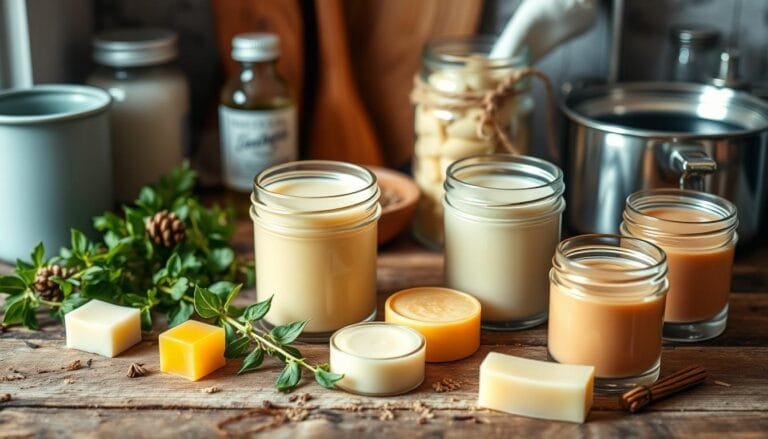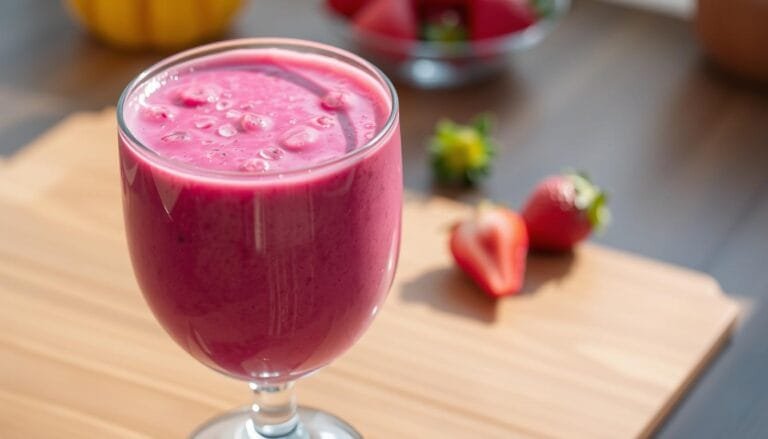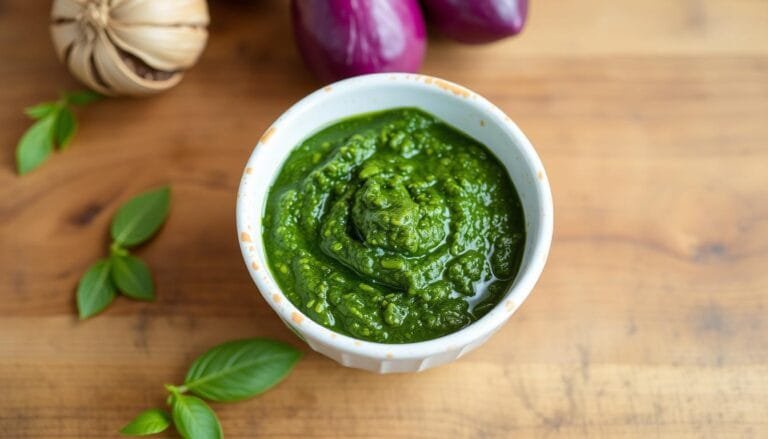I’ve struggled with anxiety myself. It feels like a heavy weight, with worries and racing thoughts. But, there’s hope. Natural, herbal solutions might help you find peace.
Anxiety affects millions globally. Many turn to natural remedies instead of drugs. Plants like ashwagandha and chamomile offer a gentle way to ease anxiety.
We’ll explore the science behind these herbs. We’ll look at the research and their benefits. We’ll also talk about safety and how to find the right herbal mix for you. Ready to find calm naturally? Let’s start!
Understanding Anxiety and Natural Treatment Options
Anxiety disorders are common in the U.S., affecting over 19% of adults yearly. These include generalized anxiety, panic disorder, and phobias. They can greatly affect one’s life. Many look for natural ways to manage anxiety, avoiding medication side effects.
Different Types of Anxiety Disorders
Anxiety disorders vary, each with its own symptoms and triggers. Here are some common ones:
- Generalized Anxiety Disorder (GAD): Persistent worry about many things, like work, health, or family.
- Panic Disorder: Sudden, intense fear or discomfort, often with physical symptoms like a fast heartbeat and shortness of breath.
- Social Anxiety Disorder: Fear or discomfort in social situations, leading to avoiding these situations.
- Phobias: Irrational, intense fears of specific objects or situations, like heights, flying, or certain animals.
Why Choose Natural Solutions
Natural treatments for anxiety can be effective without medication side effects. Options include herbal remedies, exercise, meditation, and deep breathing. These methods help manage anxiety by focusing on the mind-body connection.
The Mind-Body Connection in Anxiety Management
The mind-body connection is key in managing anxiety. Mindfulness, meditation, and yoga help individuals become more aware of their thoughts and feelings. This awareness helps regulate emotions and manage stress, leading to better anxiety management.
The Science Behind Herbal Remedies for Anxiety
Many studies have looked into how herbal remedies help with anxiety. Herbs like ashwagandha and chamomile can lower cortisol levels and ease anxiety. Valerian root might change brain chemistry to help people relax.
A study on Lavandula Angustifolia Mill showed it could help with depression and anxiety. Another study found St. John’s wort (Hypericum perforatum) to be cost-effective for mild to moderate depression. This suggests it could also help with anxiety.
Research on Cuscuta planiflora Ten. and Nepeta menthoides Boiss. & Buhse might reveal their effects on anxiety. Studies also looked at how people with mental health issues use herbal remedies. This gives us a better understanding of their role in anxiety management.
| Herb | Potential Benefits for Anxiety |
|---|---|
| Ashwagandha | Reduces cortisol levels and alleviates anxiety symptoms |
| Chamomile | Reduces cortisol levels and alleviates anxiety symptoms |
| Valerian Root | Affects brain chemistry to promote relaxation and calmness |
| St. John’s Wort | Demonstrates efficacy in treating depression, potentially impacting anxiety |
| Lavender | Decreases depression symptoms, which can be linked to anxiety |
While more research is needed, current studies show herbal remedies can help with anxiety. As herbal medicine becomes more popular, it’s important to understand its science. This knowledge helps those looking for natural ways to manage their mental health.
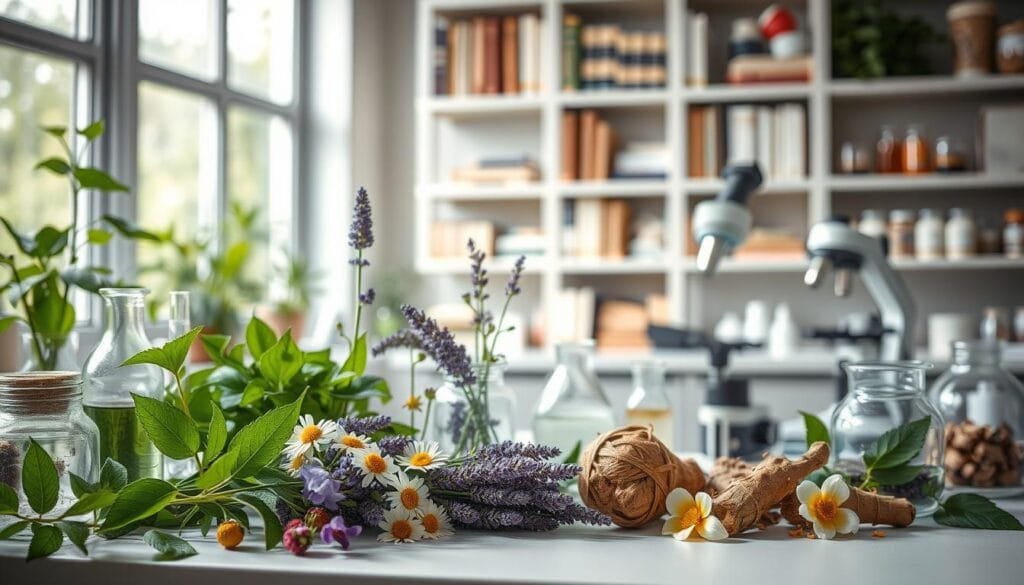
Ashwagandha: The Ancient Stress-Fighting Adaptogen
Looking for a natural way to fight everyday stress? Ashwagandha is your answer. This ancient Ayurvedic herb helps you relax, sleep better, and lower cortisol levels. Cortisol is the main stress hormone in our bodies.
Recommended Dosage and Forms
The daily dose of ashwagandha is usually 250 to 600 milligrams. It comes in capsules, tablets, and liquid tinctures. You can pick the form that fits your lifestyle best.
Scientific Studies and Evidence
Many studies show ashwagandha reduces stress and anxiety. A 2021 review found seven studies with 491 adults. Those who took ashwagandha had less stress, better sleep, and lower cortisol than the placebo group.
Research also found that 500 to 600 milligrams of ashwagandha daily helps manage stress and anxiety. For example, a study with 60 people showed it improved stress, anxiety, depression, and food cravings in just 30 days.
Potential Side Effects and Interactions
Ashwagandha is usually safe for adults, but watch out for side effects. You might feel digestive issues, drowsiness, or headaches. It can also affect certain medications like thyroid meds, immunosuppressants, and sedatives.
Always talk to a healthcare provider before adding ashwagandha to your routine. This is true if you have any health conditions.
Chamomile: Nature’s Calming Solution
Chamomile is a well-loved herb known for its calming effects. It’s a natural way to ease anxiety and help you relax. You can enjoy it as tea, take it as a supplement, or use it in aromatherapy.
Chamomile is safe for most people, including babies and adults. It’s good for sleep, boosting your immune system, and easing headaches and stomach issues. It’s a natural way to find calm.
Chamomile is packed with good stuff like flavonoids and terpenoids. Roman and German chamomile have different strengths. German chamomile has a lot of apigenin, which helps with anxiety.
“Chamomile has a long history of traditional medicinal uses, and its calming effects have been documented in numerous scientific studies.”
A study showed chamomile helps with generalized anxiety disorder. People who took chamomile supplements felt less anxious than those who didn’t.
But, if you have acid reflux or too much stomach acid, be careful. Always talk to a doctor before trying chamomile or any herbal remedy.
In short, chamomile is a great choice for those looking for natural anxiety relief. You can drink chamomile tea, use essential oils, or take supplements. It’s a gentle way to find calm and well-being.
Valerian Root: Your Natural Sleep and Anxiety Aid
Valerian root has been used for centuries to help with sleep and anxiety. This natural herb may change the brain’s chemistry. It could help you relax and sleep better.
How Valerian Affects Brain Chemistry
Researchers think valerian root might change the levels of gamma-aminobutyric acid (GABA) in the brain. GABA helps control nerve impulses, leading to calmness. Valerian could help reduce anxiety and improve sleep by affecting GABA receptors.
Best Times and Ways to Take Valerian
- Valerian is usually taken as a supplement or made into a calming tea before bed.
- Adults looking for valerian root benefits as a natural sleep aid or anxiety herb should take 300-900 mg daily, often in several doses.
- Many people mix valerian with other calming herbs like chamomile or lemon balm for better results.
While more research is needed, many studies show valerian root could be a good, natural choice for sleep or anxiety issues. But, it’s key to talk to a healthcare provider first. This is because valerian might interact with some medicines or cause side effects.

“Valerian has been used for over 1,800 years to ease insomnia, anxiety, and nervous restlessness.”
Lavender’s Soothing Properties for Mental Wellness
Struggling with anxiety, I searched for natural solutions. Lavender caught my eye. It’s known for calming effects and may help with anxiety.
Lavender essential oil seems to calm the brain. It can lower anxiety in dental patients and help new mothers. The compounds in lavender, like linalool and linalyl acetate, relax the brain.
Aromatherapy with lavender is very effective. Just 3 minutes of lavender scent can lower anxiety. Twenty minutes can even improve sleep. You can also take lavender orally, with 80 mg a day helping with anxiety.
“Lavender inhalation can significantly improve sleep quality, as shown in a study on midlife women with insomnia.”
But, use lavender safely. Follow dosage and talk to a doctor, as it can cause side effects like nausea and drowsiness.
Looking for calm? Try lavender aromatherapy and calming essential oils. Lavender offers natural anxiety relief and could help you find peace.
Passion Flower: Traditional Remedy for Modern Stress
Our fast-paced world brings stress and anxiety. Many turn to natural remedies for relief. Passion flower is one such remedy, known for its calming effects.
Different Forms and Applications
Passion flower comes in tablets, capsules, tinctures, and teas. You can make a soothing tea with dried herb. Liquid extracts and tinctures are easy to use daily. Supplements usually have 250 to 900 mg per dose for anxiety.
Safety Considerations and Usage Guidelines
Passion flower is generally safe for short-term use. But, it can make you drowsy. Pregnant or breastfeeding women should avoid it due to limited safety data. Always follow the dosage and watch how your body reacts. Talk to a healthcare provider before adding passion flower to your routine.
Passion flower is known for calming anxiety, insomnia, and pain. It helps regulate mood by affecting GABA in the brain. As research grows, passion flower could be a natural stress relief option.
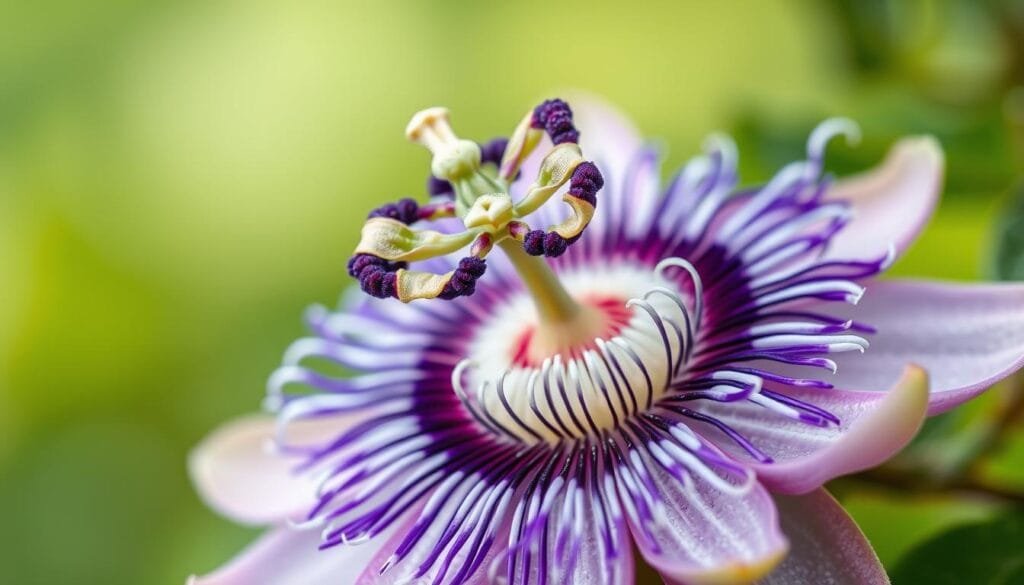
| Passiflora Incarnata Uses | Potential Benefits |
|---|---|
| Anxiety | Clinical studies suggest passion flower may have anxiety-calming effects similar to prescription medications. |
| Insomnia | Research in mice indicates passion flower can positively affect sleep patterns. |
| Menopausal Symptoms | Passion flower supplements may help reduce headaches, depression, insomnia, and anger associated with menopause. |
| Seizures | A study found that a mixture including passion flower increased the time between seizures and their durations. |
Always talk to a healthcare provider before using passion flower. With the right guidance, it can help manage stress and improve well-being.
Kava: Pacific Islands’ Anti-Anxiety Herb
Looking for a natural way to handle anxiety? Kava, from the Pacific Islands, might be a good choice. It’s been used for ages to calm nerves. But, some studies raise concerns about its safety for the liver.
Research shows kava can help with anxiety. A study found it worked better than a placebo in easing anxiety. Another study said kava helped a lot in just one week. Yet, health warnings about liver damage are out there, so talk to a doctor first.
Kava has caused liver problems in Europe, leading to its ban in some places. The FDA in the U.S. warned about liver risks in 2002. Long-term use can lead to skin issues, hair loss, hearing problems, and less appetite.
Kava might also mix badly with some medicines. This includes drugs for seizures, alcohol, and other anxiety treatments. Always check with your doctor before using kava, to avoid bad interactions.
Even with risks, people are interested in kava’s anxiety relief and stress reduction benefits. The safe dose is between 60 to 250 mg, as a 2020 review suggests. But, it’s wise to talk to a healthcare expert before adding kava to your routine.
Lemon Balm: The Gentle Mood Enhancer
Looking for natural ways to calm your mind and ease anxiety? Lemon balm (Melissa officinalis) might be what you’re searching for. This fragrant herb, part of the mint family, has been calming nerves for centuries.
Preparation Methods and Usage
Lemon balm comes in different forms to fit your needs. Here are some ways to enjoy it:
- Capsules: Take 300-500 mg of dried lemon balm capsules three times daily.
- Tea: Steep 1.5-4.5 grams of dried lemon balm herb in hot water and sip up to four times a day.
- Tincture: Add 60 drops of lemon balm tincture to water or juice daily.
You might feel the calming effects of lemon balm in 15-45 minutes. It’s a handy natural remedy for anxiety and stress.
Combining with Other Calming Herbs
Lemon balm pairs well with other herbs to boost its calming effects. Try mixing it with:
- Chamomile: Known for its calming and sedative properties.
- Valerian root: Used traditionally to promote relaxation and better sleep.
- Passionflower: Helps alleviate nervous tension and restlessness.
This blend offers a gentle yet effective way to manage anxiety and improve well-being.
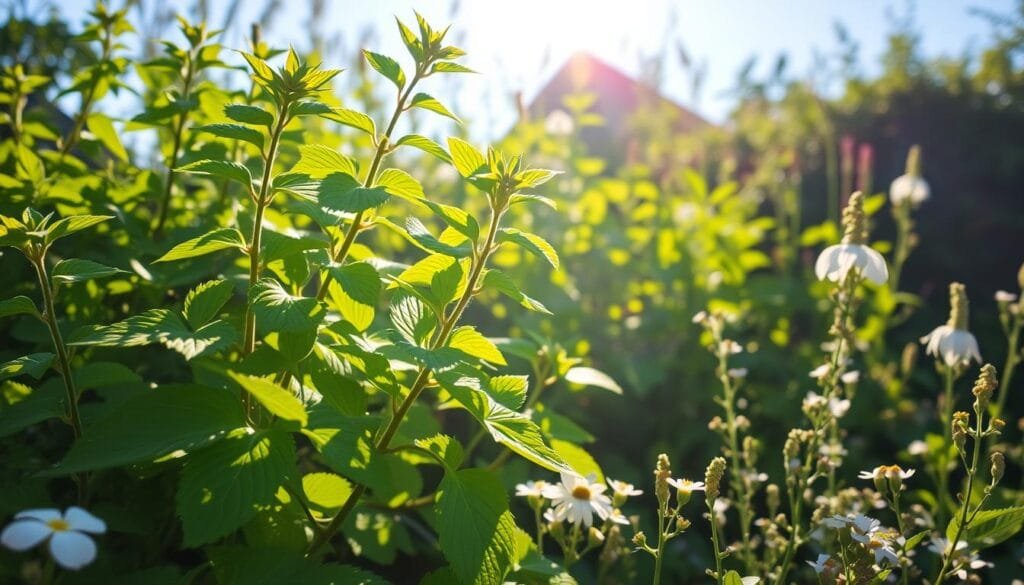
“Lemon balm has demonstrated antiviral effects against herpes lesions and exhibited activity against HIV infection in preliminary studies.”
Always talk to a healthcare provider before using herbal supplements. This is important if you have health conditions or take medications. They can help ensure lemon balm is safe and right for you.
CBD and Hemp-Based Solutions for Anxiety Relief
I’ve struggled with anxiety and looked into CBD oil and hemp products. They’re natural and don’t have the side effects of regular anxiety meds. They help people feel calm and relaxed.
Research shows CBD, a part of the hemp plant, can help with anxiety. Studies found CBD reduces anxiety in animals and people with social anxiety disorder. A 2022 study also showed young people with anxiety got better with CBD.
CBD comes in oils, gummies, and bath bombs. CBDistillery has oils from 500 mg to 5,000 mg per bottle. Sunday Scaries’ gummies, with 25 mg CBD each, help with stress and anxiety.
Even though CBD looks promising, the FDA doesn’t regulate it. This means quality and purity can vary. It’s key to pick high-quality, tested CBD and talk to a doctor before using it, if you’re on other meds.
The idea of CBD oil benefits, hemp anxiety relief, and natural stress reduction is exciting. But, we must be careful and do our research. With the right approach and doctor’s advice, we can find natural ways to manage anxiety.
“CBD has been shown to have a calming effect on the nervous system, making it a promising natural solution for anxiety and stress management.”
| Product | CBD Potency | Recommended Use |
|---|---|---|
| CBDistillery CBD Oil | 500 mg – 5,000 mg | Anxiety relief, stress management |
| Sunday Scaries CBD Gummies | 25 mg per gummy | Anxiety and stress reduction |
| CBDfx CBD Bath Bombs | 200 mg per bath bomb | Relaxation and anxiety relief |
Essential Safety Guidelines and Precautions
Natural herbal remedies can seem like a good choice for anxiety. But, it’s important to be careful. These supplements can mix with medicines and might not work for everyone. Always talk to a healthcare provider before starting any herbal treatment, especialy if you’re on other meds or have health issues.
Drug Interactions to Watch For
Some herbal remedies can make you feel too sleepy when used with anti-anxiety drugs. They can also change how blood thinners work. Herbs like St. John’s Wort might make your prescription drugs not work as well. Always tell your doctor about all the supplements you’re taking to stay safe.
When to Consult a Healthcare Provider
- If your anxiety is really bad or lasts a long time, get help from a pro. Don’t try to handle serious mental health issues by yourself.
- Talk to your doctor before trying any new herbal or natural remedy. Make sure it’s safe for you.
- If you have any bad side effects or your condition gets worse while using natural remedies, stop and talk to your doctor right away.
Herbal supplements can help with anxiety, but use them carefully. Always get advice from a healthcare expert. Your safety and health are the most important things.
“Remember, natural doesn’t always mean safe. Herbs and supplements can have strong effects, both good and bad. They can also mix with medicines and health conditions.”
Creating Your Personal Anti-Anxiety Herbal Protocol
Creating a personalized anti-anxiety herbal protocol starts with knowing your symptoms and needs. Mix different herbs with natural methods like meditation or exercise. This way, you can manage stress and anxiety well.
Begin by looking into herbs like Ashwagandha, Chamomile, Valerian Root, and Lavender. Try small amounts of these herbs and see how you react. Keep a journal to note your progress and any side effects.
What works for one person might not work for another. It’s important to talk to a healthcare provider or certified herbalist often. They can help you adjust your herbal protocol for the best results. This way, you’ll find the right mix of natural solutions to feel calm and well again.
